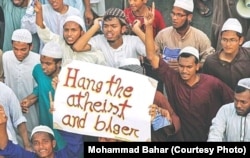One day after Singapore deported 26 Bangladeshi Muslim migrant workers who had been arrested in November for allegedly supporting the ideology of Islamist terrorist groups like al-Qaida and the Islamic State, authorities in the southeast Asian nation said the men were contemplating "armed jihad" in the Middle East and Bangladesh.
Following a primary investigation, including interrogation of the deportees, Bangladesh police said Thursday that the men were members of Ansarullah Bangla Team (ABT) — a banned Bangladeshi hard-line Islamist militant outfit charged in a series of killings of atheist bloggers in the country last year.
"We have got no proof of the men having links with IS or al-Qaida,” said Monirul Islam, a joint commissioner of the Detective Branch of Dhaka Metropolitan Police (DMP). “But, we have found that they are the followers of [firebrand Muslim cleric and chief of ABT] Jasimuddin Rahmani, and they were working to get him released from jail."
Earlier this month, Rahmani was sentenced to five years in jail in connection with the 2013 killing of atheist blogger Rajib Haider.
Bangladesh police have charged 14 of the deported men under the Anti-Terrorism Act.
"We arrested the 14 men after a primary investigation in Bangladesh found that they might have some connection to militancy,” Mashrukure Rahman, a deputy commissioner of DMP, told the media. “The other 12 were released because we did not find them linked to militancy. However, they are under our close observation."
Discreet meetings
Police in Singapore arrested 27 Bangladeshi construction workers between November 16 and December 1 of last year, after keeping them under surveillance for many months.
According to Singapore's Ministry of Home Affairs (MHA), 26 of the workers had been members of a closed religious study group since 2013, and they supported the teachings of U.S.-born radical Islamic cleric Anwar al-Awlaki, who was killed in a drone strike in Yemen in September 2011.
"The group members took measures to avoid detection by the authorities,” according to an MHA statement issued Wednesday. “They shared jihadi-related material discreetly among themselves, and held weekly meetings and gatherings where they discussed armed jihad and conflicts that involved Muslims. They also carefully targeted the recruitment of other Bangladeshi nationals to grow their membership.”
Several members of the group admitted to authorities in Singapore that they supported the Bangladeshi militant groups that had killed Shi'ites in Bangladesh in recent months, because they viewed them as "deviant."
‘Silent killings’
According to the MHA, the men said they were angry with the Bangladeshi government over its actions against the Islamic groups and admitted they had been asked by their leaders to return to their homeland to wage armed jihad against the government.
"They had also sent monetary donations to entities believed to be linked to extremist groups in Bangladesh,” the MHA statement said. “A significant amount of radical and jihadi-related material like books and videos, including footage of children undergoing training in what appeared to be terrorist military camps, were recovered from the possession of the group.
"Several members also had a shared document containing graphic images and instruction details on how to conduct ‘silent killings’ using different methods and weapons."
Immediately after their arrest in Singapore, the local work passes of the 27 men were revoked.
While 26 of them were deported to Bangladesh, the remaining migrant worker — who, according to police, was not a member of the religious study group but was "in the process of becoming radicalized" — is serving a 12-week jail term for attempting to flee Singapore illegally. He will be deported to Bangladesh when he finishes his jail term, the MHA said.
Migrant backlash
Though the 27 men had not planned any terror attack targeting Singapore, they posed a threat to the country, according to the MHA.
In a Facebook post, Singapore's Prime Minister Lee Hsien Loong wrote: "Fortunately they were plotting nefarious activities in Bangladesh, and not in Singapore. But they were still a serious threat to us. We are tightening up our security, and acting to protect our racial and religious harmony. Radicalization and terrorism must never take root in Singapore."
However, Home Affairs Minister K. Shanmugam said in an earlier Facebook post that the men "could have easily changed their minds and attacked Singapore."
Many Bangladeshi migrant workers said that the Bangladeshi group's activities threatened to put other migrants in trouble.
"Such radical activities by a handful of men have potential to trigger a backlash against all Bangladeshi migrants or even the entire Muslim community in Singapore," Bangladeshi migrant Mohammad Ismail, who works in a dockyard in Singapore, told VOA.
Parbez Rahman, another migrant construction worker, told Channel News Asia that such radicalized individuals should not be allowed to stay in Singapore.





